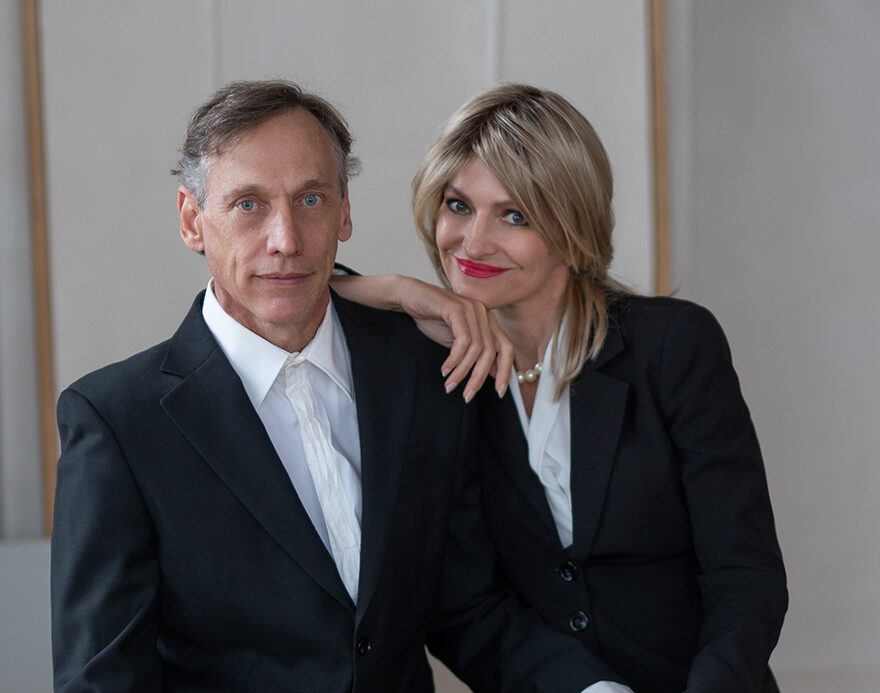Why Understanding Your Love Languages Is Just the Tip of the Iceberg
Have you ever taken a love languages quiz, excited to finally "crack the code" to better relationships, only to find that it doesn't really solve your underlying problems? You're not alone. Millions search for insights into how they give and receive love, hoping it will magically resolve their issues and conflicts. But what if I told you that understanding your love languages is just the tip of the iceberg? Beneath the surface lies a deeper truth: your relationship struggles might be more about *you* than about your partner, or the relationship itself. What personal patterns or personal unresolved issues are showing up in your interactions? Let's explore why relationship issues typically reflect individual challenges and how committing to personal growth can unlock lasting change.
In this article, we'll dive into the idea that relationship issues aren't problems to be fixed but windows into your own evolution process. By the end, you'll have practical steps to expedite your journey of personal growth, and gain a deeper romantic connection. Whether you're dealing with recurring arguments or feeling stuck in your personal life, this perspective could shift everything. Ready to look inward?
Why Relationship Issues Aren’t What They Seem
Think about the last time you had a fight with your partner. Was it really about the dishes left in the sink, or was something deeper at play? Most relationship conflicts—like arguments, trust issues, or emotional distance aren't isolated issues in the partnership. They often stem from individual struggles, such as insecurity, unhealed emotional wounds, or limiting beliefs carried from past experiences. Trauma and emotional wounds resulting from past experiences follow us into our current experience, until we figure out how to heal them.
For example, consider jealousy. A partner's possessiveness might seem directed at you, but what if it's rooted in their fear of abandonment from childhood? Or miscommunication: One person shuts down during tough talks because vulnerability feels too risky, echoing old patterns of rejection. These aren't just "relationship problems"—they're signals of personal areas needing attention.
Research from the Gottman Institute backs this up. Their studies show that couples with high levels of self-awareness and emotional intelligence experience significantly better outcomes, with divorce rates dropping by up to 70%. Why do relationships fail so often? It's rarely because of surface-level mismatches; it's because unaddressed personal issues keep resurfacing. Ask yourself: What recurring issue in my relationships might be pointing to something within me? Just recognizing this can be the first step toward real solutions. Fortunately there's a way to rapidly heal these emotional wounds in real time without years of therapy.
"To love without knowing how to love wounds the person we love." - Zen Buddhist Teacher Thich Nhat Hanh
| A very typical, and even more common, underlying cause of confrontation, arguments and conflict is keeping score. Its an evolutionary mechanism of the human mind, focusing on anything that doesn't seem to serve us, so we can learn to avoid it. We don't do it on purpose, we're simply conditioned to keep score based on an erroneous understanding of the personal growth process which produces a self-defense-like attitude. Whenever we feel unheard, unrecognized, ignored, used, manipulated, or otherwise badly-done-by, we add another black check-mark to a record of "offenses" that is stored away subconsciously, slowly breeding a growing resentment. Whenever things aren't going our way, this stored account of unresolved stuff, and all the associated resentment, come to the surface to trigger emotional volatility and outbursts. The good news is that this process can be hacked and corrected by revising our understanding of the personal growth process and the underlying dynamics and mechanisms in human interactions. Understanding love languages feeds into better understanding intentions and therefore not building as much resentment, but to really solve this issue it needs to be corrected at a more fundamental level, within the mechanism itself. |
Relationships as a Mirror for Personal Evolution
Imagine your relationship as a full-length mirror, reflecting not just your appearance but your inner world. Every human interaction highlights personal triggers, blind spots, and growth opportunities. This is most intensely present in our significant relationships, probably because we care about the connection and cannot simply walk away. When things like fear of rejection shows up as defensiveness, or low self-worth manifests as people-pleasing, it's your relationship amplifying these for you to see.

This mirror effect is powerful because it forces us to confront what we might otherwise try to ignore, because lets face it, humans tend to be inherently lazy. Evolving personally, through evolving your understanding of human nature, your personality, the personal growth process, and through self-reflection, developing new habits and behaviors, self-empowerment, or expanding your wisdom and understanding, etc. doesn't just improve you; it transforms how you show up in the world, and how you connect with others. As you heal old wounds, you bring more authenticity and empathy to the table, creating space for deeper bonds.
But why does all this matter in the big picture? Well, because relationships aren't the end goal - they're the just a stage on which your personal evolution plays out. "Your relationship isn’t the problem," as one might say; "it’s the arena where your growth unfolds." Have you noticed how certain people or situations keep triggering the same reactions in you? What might that reveal about areas ready for change? By viewing relationships this way, you shift from blame to curiosity, fostering growth that benefits every area of life. Another major advantage of this understanding is the evolution of your capacity to love. When you recognize that loving someone for specific traits, or for what they do for you, is superficial, and instead replace that with a true appreciation for the contribution they made to your growth through your ongoing interactions, your love for them begins to evolve beyond infatuation and matures towards unconditional acceptance and appreciation for who they truly are as individuals.
No Quick Fixes—Growth Takes Time
In a world of instant gratification, it's tempting to seek shortcuts for relationship woes. A love languages quiz might reveal you crave words of affirmation while your partner shows love through acts of service, a great insight! But without deeper work, it's like putting a band-aid on a wound that needs stitches. How to fix relationship problems isn't about quick tweaks; it's about outgrowing the underlying personal patterns and dysfunction causing them.
Quick fixes fall short because they address symptoms, not the cause. For instance, learning to communicate better is helpful, but if insecurity drives your defensiveness, no amount of "I statements" will stick until you tackle that core issue. True change requires understanding, wisdom, effort, time and intention: evolving your understanding the dynamics and mechanisms of human interaction, identifying your personal triggers through attention and journaling, managing emotions at first with mindfulness and eventually with permanent shifts in perspective, or consulting with an expert to unpack past wounds and re-frame past experiences.
Spiritual growth plays a key role here too. Practices like meditation and developing genuine gratitude can shift your perspective, helping you see challenges as opportunities rather than threats or punishments. How might incorporating a daily reflection ritual change how you respond in tense moments? Start small—try asking yourself at the end of each day: "What did today's interactions teach me about myself?" Over time, these habits build resilience, turning "problems" into pathways for spiritual growth in relationships. Something that is often overlooked in the spiritual development arena is the need to evolve our identity or "idea of ourselves" beyond the self-centered ego persona. Our identity narrative becomes a prison if it becomes rigid and inflexible, trapping us in narrative loops that inaccurately or insufficiently describe ourselves and our experience.
Remember, growth isn't linear. There will be setbacks, but each one is a chance to deepen your understanding. What quick fix have you tried in the past that didn't last? Recognizing and reflecting on that can guide you toward more sustainable approaches.
"Self knowledge is the begining of all wisdom." - Aristole
How Personal Evolution Transforms Relationships
As you commit to growing - emotionally, spiritually, and mentally - something magical happens: your relationships evolve naturally along with you. Picture someone overcoming deep-seated insecurity; suddenly, they're more open, setting healthier boundaries and communicating with genuine vulnerability. The ripple effects are profound: better empathy, stronger trust, and connections that feel alive rather than strained. Not only that, but those around us change their behaviors too, responding differently because of our shifts in the way we see ourselves. I've personally experienced this many times, and seen it borne out thousands of times while working with clients - when an individual shifts their view of themselves, they report sudden changes in the dynamics between themselves and others, especially those close to them.
This transformation isn't about changing your partner, it's about growing and showing up as your best self. With heightened self-awareness and understanding, you navigate challenges and conflicts with grace, turning potential blowups into meaningful conversations. How to improve relationships becomes less about strategies and more about individually embodying growth. For example, after working through your fear of intimacy, you might find yourself forming deeper friendships, excelling at work collaborations, or even attracting a more aligned romantic partner.
Inspire yourself with this: When you evolve personally, your relationships don’t just survive, they come alive and thrive. Self-improvement for better relationships creates a virtuous cycle, where personal wins fuel relational harmony. What one area of growth could you focus on today to see this shift in your own life? The key is consistency; small, daily steps compound into profound change.
Conclusion
Love languages are a useful tool, offering insights into how we connect. But real, lasting change in relationships comes from addressing personal issues and committing to ongoing growth. By viewing challenges as mirrors for your evolution, you move beyond quick fixes toward a more fulfilling life. A life where relationships reflect your own inner strength and wisdom.
Are you ready to transform your relationship through personal evolution?
Sign up for our newsletter on relationships, personal evolution and spiritual development [ https://grahamandmonikaburwise.com/newsletter/ ], or download our free Growth Journal Questions to start navigating your way to deeper insights today. These resources are designed to launch you in the right direction and to support you every step of the way.
I'd love to hear from you: What’s one personal growth goal you’re working on to improve your relationships? Share in the comments below - your story might inspire someone else on their journey. Let me know in the comments what you found useful, and what you'd like more detailed on. For more detailed explanations on how exactly to approach personal growth and evolution, you can explore the other articles on our blog for more insights and information?


